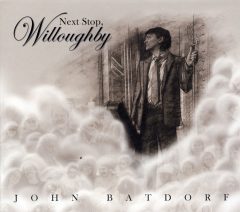CD Reviews
JOHN BATDORF: Next Stop, Willoughby
The latest album from John Batdorf is Next Stop, Willoughby. He has been in the music biz for 50 years, doing just about everything–as a hot new talent with a big label contract, a session musician with artists as varied as Jefferson Starship, Rod Stewart, Motley Crue, and Adele, and working as a staff writer for network television. He also has released many albums both as a solo artist and with others, including James Lee Stanley and Michael McLean. His songs are primarily acoustic pop and soft rock, which use his upper register vocals to anchor plenty of sharp, tight vocal harmonies. The ten tunes are written by Batdorf and McLean; Batdorf plays the instruments, produces, and mixes–and it is slick and solid throughout. While its upbeat nature might give the impression that Batdorf’s music is lightweight, it is probably fairer to say that he includes some introspective songs and even protests, he just doesn’t do them in a strident manner.
“Willoughby” opens, about the Twilight Zone TV episodes from his youth, especially one that concerned a character’s idyllic home town: “We’re as happy as can be/ ‘Cause we’re here in Willoughby.” Batdorf keeps pushing the positive buttons on “I’m In Love With You” and “Don’t It Make You Wonder Why,” both of which are floating pop confections that sing love’s praises with heavenly backing vocal harmonies and catchy hooks.
He is down on his luck for “Sure Could Use Some Love,” which makes more of an impression. He has had some bad breaks and is feeling sad, but the sun is still shining–he just wants it to shine on him. The spare instrumentation here and elsewhere keeps the focus squarely on Batdorf’s impressive voice. “They Can’t Have Everything” has a beat and an attitude, about the one percent robbing from society; Batdorf fudges the spots where a profanity would fit the rhymes–he will do protest, but not use four letter words. It still is a highlight here, grounded in the real world.
The second half of the album is where it shines. On “Take a Good Look at You Now” Batdorf tells the listener to look within, “Have you forgotten who you are/ Have you drifted off too far?/ Have you lost your guiding star?” The song has some good up-tempo energy behind it, helping to push its message forward. Another tune late in the program that sinks in is “I Remember You,” which has the catchiest hook on the album and uses a full-band arrangement to drive it home. The best slow and quirky tune on this album is “The One That Got Away,” which has an interesting, haunting guitar figure, while unhurried fingerpicked guitars lay down verses that give Batdorf a chance to sing about regrets: “Things I know are all on me/ and I know I can’t undo the consequences.” It is a delicate and involving highlight.
Next Stop, Willoughby is more good pop from John Batdorf, a polished master of the form.











